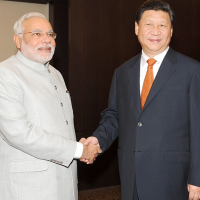Border Tensions Flare Up Ahead of Chinese President’s Visit
 Modi and Xi met for the first time in July at the BRICS summit in Brazil
Modi and Xi met for the first time in July at the BRICS summit in Brazil
Border tensions have flared up between India and China ahead of President Xi Jinping’s maiden visit to India this week. India said on Tuesday it would firmly defend its 3,500-km-long border with China after the Hindustan Times reported that more than 200 soldiers of the People's Liberation Army crossed into Ladakh last week and used cranes, bulldozers and a Hummer vehicle to build a 2-km road within Indian territory.
According to the newspaper, Indian soldiers challenged the Chinese troops and asked them to withdraw. Then, on the night of September 10, soldiers demolished a temporary track built by Chinese forces. There was no immediate comment by India's defence ministry.
Despite this, both countries are trying to put a positive spin on the first summit meeting between Prime Minister Narendra Modi and the Chinese president.
India and China are expected to ramp up commercial ties and open the way for Chinese investment in Indian infrastructure, including railways, but their contested border remains a stumbling block to better political ties.
Both lay claim to vast tracts of territory and after two decades of talks are no closer to a resolution of the border dispute over which they went to war in 1962. Modi and Xi are expected to discuss the border dispute this week.
"Let me assure you that our brave sentinels on the border will address any issue that happens on the border," said foreign ministry spokesman Syed Akbaruddin. "We are confident that our borders are in safe hands."
In Beijing, Hong Lei, a spokesman for the Chinese foreign ministry, said the border issue had not affected the development of bilateral ties.
"We hope that both sides can continue efforts to keep maintaining the peace and tranquillity of the border area and create a good atmosphere and good conditions for the development of relations," he told reporters.
According to Reuters, India has reported a jump in border violations in the past two years that military experts say is a sign of greater Chinese assertiveness. The Indian government itself has sought to play down the incursions.
The number of Chinese infringements this year had reached 334 by August, the government told parliament last month. The corresponding figure for the whole of 2013 was 411, while in 2012 it was 426. This is double the infringements in 2011 - 213 - and in 2010 when the figure stood at 228.
China denies intruding into Indian territory.
Meanwhile, India on Monday extended a $100-million export credit for defence deals to Vietnam, which has strained ties with China over a territorial dispute in the South China Sea.
India will also "consolidate" energy cooperation with the Southeast Asian country, following a 2013 pact under which PetroVietnam offered India's ONGC oil and gas blocks for exploration and production.
Chinese foreign ministry spokesman Hong said that if that pact covered parts of the South China Sea that China considered its territorial waters, and any exploration went ahead without China's approval, the Chinese government would be "concerned".
Both India and China are seeking to engage countries in each other’s area of influence in a bid to expand influence across Asia. India is strengthening ties with Japan and Vietnam, while the Chinese president has visited the Maldives and Sri Lanka before arriving in New Delhi.
To Learn More:
Ahead of Chinese president’s visit, confrontations along border in Ladakh (by Rajat Pandit, The Times of India)
India says boundary issue will be discussed during Xi's visit (PTI)
Just ahead of Xi visit, India-Vietnam deal on China’s mind (by Sutirtho Patranobis, Hindustan Times)
With eye on China, India to develop disputed border region (by Tommy Wilkes, Reuters)
- Top Stories
- Controversies
- Where is the Money Going?
- India and the World
- Appointments and Resignations
- Unusual News
- Latest News
- India College Chain’s Expansion into U.S. Draws Opposition from Massachusetts Officials over Quality of Education
- Milk Shortages in India Tied to Release of New Movies Featuring Nation’s Favorite Stars
- Confusion Swirls around Kashmir Newspaper Ban in Wake of Violent Street Protests
- Polio-Free for 5 Years, India Launches Vaccine Drive after Polio Strain Discovery
- New Aviation Policy Could Increase Service, Lower Ticket Prices






Comments